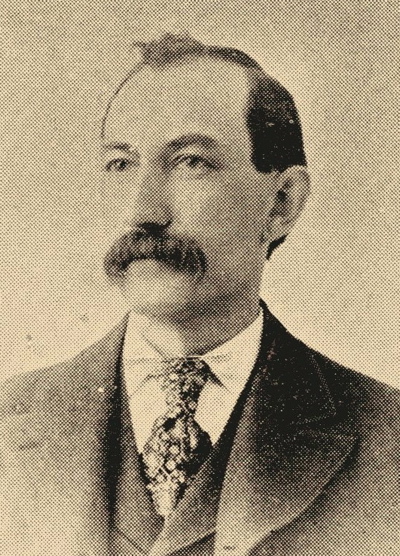Encyclopedia Dubuque
"Encyclopedia Dubuque is the online authority for all things Dubuque, written by the people who know the city best.”
Marshall Cohen—researcher and producer, CNN
Affiliated with the Local History Network of the State Historical Society of Iowa, and the Iowa Museum Association.
OLINGER, Peter: Difference between revisions
No edit summary |
No edit summary |
||
| Line 3: | Line 3: | ||
In 1891 Olinger sold his livery business but retained his interest in buying and selling horses. (2) He owned the celebrated horse "Keno F." | In 1891 Olinger sold his livery business but retained his interest in buying and selling horses. (2) He owned the celebrated horse "Keno F." | ||
Olinger was elected mayor of Dubuque in 1894 capping a political career that began in 1892 with his election as alderman from the Third Ward. One of his first suggestions was to encourage "economy" in city affairs. In April 1894 the council reduced the city engineer's salary from $3,300 to $1,800. The city marshal had been paid $1,200 plus all the fees he assessed. He retained his salary, but the fees were sent to the city treasurer. Fees once collected by the city recorder were taken from him although he retained his salary of $1,200. (3) | Olinger was elected mayor of Dubuque in 1894 capping a political career that began in 1892 with his election as alderman from the Third Ward. One of his first suggestions was to encourage "economy" in city affairs. In April 1894 the council reduced the city engineer's salary from $3,300 to $1,800. The city marshal had been paid $1,200 plus all the fees he assessed. He retained his salary, but the fees were sent to the city treasurer. Fees once collected by the city recorder were taken from him although he retained his salary of $1,200. (3) Olinger was opposed to any further road repairs in which grading cost more than $100 per block. (4) Newspaper accounts of his tenure as mayor celebrated his administration's fiscal soundness in which $60,000 of city indebtedness was repaid. His term also saw such civic improvements as increased brick paving and expanded sanitary connections. | ||
Olinger | During the month of May, 1894 Olinger gradually replaced at least a half dozen police officers for reasons not stated in the newspaper. (5) | ||
| Line 19: | Line 19: | ||
4. "An Era of Economy," ''Dubuque Daily Herald'', May 17, 1892, p. 4. Online: https://news.google.com/newspapers?nid=_OG5zn83XeQC&dat=18920517&printsec=frontpage&hl=en | 4. "An Era of Economy," ''Dubuque Daily Herald'', May 17, 1892, p. 4. Online: https://news.google.com/newspapers?nid=_OG5zn83XeQC&dat=18920517&printsec=frontpage&hl=en | ||
5. "Municipal Molecules," ''Dubuque Daily Herald'', May 23, 1894, p. 4 | |||
Revision as of 18:07, 23 December 2016
OLINGER, Peter. (Luxembourg, June 11, 1854--Dubuque, IA, July 29, 1904). MAYOR. Olinger migrated to the United States in 1871 and came directly to Dubuque. After eighteen months as a farm hand, he moved to the city and began a livery business that he maintained for fifteen years. In 1877 he also opened a saloon and grocery store on the corner of Clay and 17th Street. (1)
In 1891 Olinger sold his livery business but retained his interest in buying and selling horses. (2) He owned the celebrated horse "Keno F."
Olinger was elected mayor of Dubuque in 1894 capping a political career that began in 1892 with his election as alderman from the Third Ward. One of his first suggestions was to encourage "economy" in city affairs. In April 1894 the council reduced the city engineer's salary from $3,300 to $1,800. The city marshal had been paid $1,200 plus all the fees he assessed. He retained his salary, but the fees were sent to the city treasurer. Fees once collected by the city recorder were taken from him although he retained his salary of $1,200. (3) Olinger was opposed to any further road repairs in which grading cost more than $100 per block. (4) Newspaper accounts of his tenure as mayor celebrated his administration's fiscal soundness in which $60,000 of city indebtedness was repaid. His term also saw such civic improvements as increased brick paving and expanded sanitary connections.
During the month of May, 1894 Olinger gradually replaced at least a half dozen police officers for reasons not stated in the newspaper. (5)
---
Source:
1. "Caught on the Fly," Dubuque Herald, April 6, 1877, p. 4. Online: https://news.google.com/newspapers?nid=uh8FjILnQOkC&dat=18770406&printsec=frontpage&hl=en
2. "Peter Olinger Sells Out," Dubuque Daily Herald, March 13, 1891, p. 4
3. "Used a Pruning Knife," Dubuque Daily Herald, April 19, 1894, p. 5. Online: https://news.google.com/newspapers?nid=_OG5zn83XeQC&dat=18940419&printsec=frontpage&hl=en
4. "An Era of Economy," Dubuque Daily Herald, May 17, 1892, p. 4. Online: https://news.google.com/newspapers?nid=_OG5zn83XeQC&dat=18920517&printsec=frontpage&hl=en
5. "Municipal Molecules," Dubuque Daily Herald, May 23, 1894, p. 4
Oldt, Franklin. History of Dubuque County, Iowa. Chicago: Western Historical Company, 1880, p. 855
Portrait and Biographical Record of Dubuque, Jones and Clayton Counties, Iowa. Chicago: Chapman Publishing Company, 1894, p. 128


